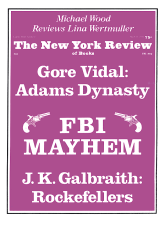In response to:
The Psychopathology of Journalism from the December 11, 1975 issue
To the Editors:
In The New York Review of December 1, 1975, Alexander Cockburn cited my views on the destruction of Guernica, as given to Phillip Knightley on July 16, 1973. Unfortunately for me, at that time I had not really sifted out my thoughts on the subject. Between that time and the proofs of Knightley’s book, my views on Guernica had altered slightly, or rather deepened. I am, of course entirely responsible for my letter to Knightley, who has kindly consented to make a slight change in his future editions, citing me to read somewhat as follows: “Why was it done? This is more speculative, for nobody in the know has so far come forward to tell us why. My hypothesis is that it was part of the strategical plan to break down Basque morale, and to help bring about the surrender of Bilbao, by showing how the city, if defended, could be reduced to rubble and ashes.” It is true, as I wrote Knightley, that “German documents tend to show that it [the attack on Guernica] was a tactical operation. But these documents are not trustworthy, and I consider them part of the cover-up.” I also wrote: “There is nothing to show that the Germans wanted to test civilian morale.” This was, in my opinion, a Franco-Spanish Nationalist idea. The above is essentially what I write in one of the conclusions of my book La Destruction de Guernica (Paris, Ruedo Ibérico, 1975). This book will appear in the Spring under the title Gernika! Gernika!, University of California Press.
Herbert R. Southworth
Indres, France
Alexander Cockburn replies:
It is most useful to have this clarification of his views from Professor Southworth. But perhaps Mr. Phillip Knightley will have to do more than effect the “slight change” Professor Southworth indicates he will be making in future editions. After all, Mr. Knightley tried to refute what he termed “the legend of Guernica” allegedly fostered by correspondents there at the time by quoting Southworth as having concluded that it was for the Germans “a tactical operation” and Professor Hugh Thomas as having said much the same sort of thing. Now Southworth thinks that the terror bombing was “a Franco-Spanish Nationalist idea,” “…part of the strategical plan to break down Basque morale….”
What does Professor Thomas now think? To judge from his recent discussion of the matter in the Times Literary Supplement (January 23, 1976), he seems to have concluded that the Germans, particularly Colonel von Richthoven, may well have planned the raid with more than “tactical” considerations in mind—and that there was designedly a terror attack on the town itself. Conversely Professor Thomas seems inclined to absolve the Spanish Nationalists, though he does not reckon the evidence to be conclusive.
The two historians used by Knightley to belabor the poor journalists thus express contradictory views. Perhaps it is therefore somewhat impertinent of Knightley to admonish journalists for sensationalizing the raid, saying that if they had not been there “Guernica would have passed unnoticed, just another incident in a brutal civil war….”
If those journalists picking their way through the dead bodies and rubble of Guernica had waited thirty-eight years for “an objective assessment” before sending off their dispatches they would not, given the conclusions of Southworth and Thomas, have been much the wiser. On the evidence of their eyes, they called the raid for what—so far as the inhabitants of the town were concerned—it was: an exercise in terror.
This Issue
March 18, 1976



